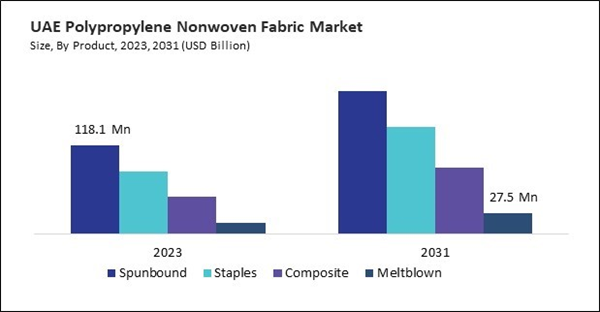The industrial sector represents a significant application area within the market, where these versatile materials find various uses across a range of industrial applications. Polypropylene nonwoven fabrics are valued in the industrial sector for their durability, strength, and resistance to chemicals and abrasion, making them suitable for demanding industrial environments. In terms of volume, the consumption by the industrial sector in Brazil was 23.5 Kilo Tonnes in 2023.
The Brazil market dominated the LAMEA Polypropylene Nonwoven Fabric Market by Country in 2023 and would continue to be a dominant market till 2031; thereby, achieving a market value of $932.3 Million by 2031. The Argentina market is showcasing a CAGR of 7.9% during (2024 - 2031). Additionally, The UAE market would register a CAGR of 6.9% during (2024 - 2031).
Manufacturers are focusing on offering customized polypropylene nonwoven fabrics tailored to specific applications in industries such as automotive, healthcare, and construction. Customization allows for improved performance characteristics, addressing the unique needs of diverse end-use sectors and expanding the market's reach. Ongoing innovation in coatings and finishes applied to these fabrics, enhancing properties such as water repellency, flame resistance, and UV protection.
Increasing incorporation of recycled polypropylene materials into nonwoven fabric production aligns with the broader trend of sustainable material sourcing. Using recycled materials addresses concerns related to plastic waste and positions polypropylene nonwovens as environmentally responsible choices. A confluence of technological advancements, sustainability imperatives, and evolving consumer preferences marks the future of the market.
Rapid urbanization and population growth drive the need for new infrastructure, housing, and commercial spaces, stimulating construction activities. Governments in LAMEA frequently invest in infrastructure projects, including transportation, energy, water, and telecommunications. In particular, tourist destinations in Latin America and Africa experience growth in the tourism sector. This drives the demand for hotels, resorts, and other hospitality infrastructure, leading to increased construction activities. Polypropylene nonwoven fabrics are used in construction for various purposes, such as geotextiles, landscape fabrics, roofing materials, and insulation. Thus, tourism and construction expansion in the region are factors driving the market's expansion.
Based on Application, the market is segmented into Hygiene, Medical, Geotextiles, Industrial, Furnishings, Carpet, Agriculture, Automotive and Others. Based on Product, the market is segmented into Spunbound, Staples, Composite and Meltblown. Based on countries, the market is segmented into Brazil, Argentina, UAE, Saudi Arabia, South Africa, Nigeria, and Rest of LAMEA.
List of Key Companies Profiled
- Kimberly-Clark Corporation
- Berry Global Group, Inc.
- Schouw & Co.
- Mitsui Chemicals, Inc.
- Toray Industries, Inc.
- Freudenberg SE
- Ahlstrom
- Berkshire Hathaway, Inc.
- SABIC (Saudi Arabian Oil Company)
- Asahi Kasei Corporation
Market Report Segmentation
By Application (Volume, Kilo Tonnes, USD Billion, 2020-2031)- Hygiene
- Medical
- Geotextiles
- Industrial
- Furnishings
- Carpet
- Agriculture
- Automotive
- Others
- Spunbound
- Staples
- Composite
- Meltblown
- Brazil
- Argentina
- UAE
- Saudi Arabia
- South Africa
- Nigeria
- Rest of LAMEA
Table of Contents
Companies Mentioned
- Kimberly-Clark Corporation
- Berry Global Group, Inc.
- Schouw & Co.
- Mitsui Chemicals, Inc.
- Toray Industries, Inc.
- Freudenberg SE
- Ahlstrom
- Berkshire Hathaway, Inc.
- SABIC (Saudi Arabian Oil Company)
- Asahi Kasei Corporation









